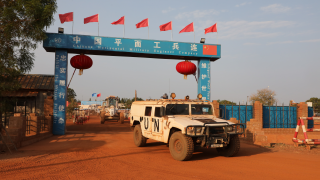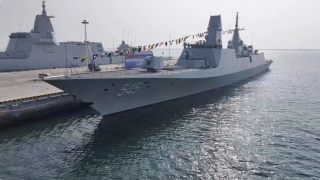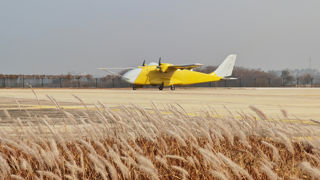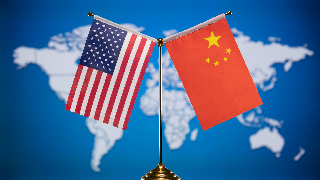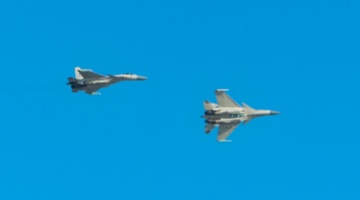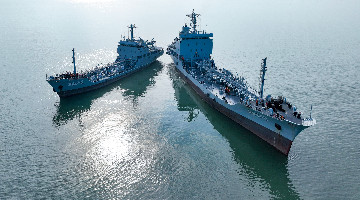By Dong Jingjing and Wang Yiming
On March 31, local time, Philippine President Ferdinand Romualdez Marcos Jr. signed an executive order emphasizing the need to strengthen the country's maritime security and maritime domain awareness to address the so-called "range of serious challenges." The core elements of the executive order involve reorganizing the National Coast Watch Council (NCWC) to the National Maritime Council (NMC), which serves as the central body in-charge of formulating policies and strategies and has expanded to include the National Security Council, the Office of the Solicitor General, and the National Intelligence Coordinating Agency.
In contrast to similar executive orders issued in 2011, incumbent Philippine President Marcos demanded the Philippine military to increase its support for the new NMC, replacing the previous "Philippine Navy" with the "Armed Forces of the Philippines" on the council's supporting agency list and increasing the registrations in the list from nine to 13.
In this regard, Xu Liping, a researcher at the National Institute of International Strategy and director of the Center for South Asian Studies at the Chinese Academy of Social Sciences, analyzed that the Philippine administration's reorganization of the NMC is to build a foundation for the country's next moves in the South China Sea, and its demand to augment military support is highly purposeful and provocative. The Philippine side aims to enhance mobility by strengthening equipment setup and personnel training while elevating military intelligence efficiency.
In early March, Philippine President Marcos said during his presence at the ASEAN-Australia Special Summit in Australia that the economic and trade cooperation between the Philippines and China can be traced back to 600 years ago, and even today, most Filipinos have "Chinese blood", adding that the Philippines has economic reliance on China and proposing to resolve disputes with these-called "peaceful means".
However, the day after the Philippine leader talked about "Chinese blood", the transport vessels and coast guard ships of this country intruded into waters off Ren'ai Jiao of China's Nansha Qundao in an attempt to deliver supplies including construction materials to its illegally grounded warship. The same action was repeated on March 23.
Xu Liping commented that the Philippine side's contradictory words and deeds aim at reaping economic benefits from China on the one hand while provoking China over the South China Sea issue on the other hand, but such behaviors seriously underestimate China's resolution and will to safeguard its sovereignty. The Philippines' mistaken judgment of the South China Sea issue will ultimately prove detrimental to its own interests.
Apart from continuously initiating provocations in the South China Sea, the Philippines has persistently courted countries outside the region to incur more uncertainties to regional stability. Philippine President Marcos recently stated that he would continue to place the country’s bilateral relationship with the US in a paramount position. Meanwhile, he expressed support for the so-called "AUKUS" alliance forged by the US, the UK and Australia, asserting that it strengthens the so-called positions of Asia and ASEAN.
For this, Xu believes that courting countries outside the region not only fails to ensure security for the Philippines but also has the potential to inflict damage. The Philippines' enhanced military cooperation activities with the US, Japan and other countries, including conducting joint military exercises or military equipment cooperation, have violated the Declaration on the Conduct of Parties in the South China Sea (DOC) and made the South China Sea issue more complicated and internationalized in nature. ASEAN will not allow the Philippines to disrupt the South China Sea through its reliance on powers outside the region. Peace and stability in the South China Sea are in line with the overall interests of regional countries. Therefore, ASEAN countries will surely not tolerate the Philippine government to elevate its self-interests above their common good.
Former Philippine President Gloria Macapagal Arroyo recently attending the Boao Forum for Asia (BFA) Annual Conference 2024 in China said that the oriental way pursued by Asian countries is the best approach to resolve conflicts and differences. Xu Liping also indicated that the oriental way is meant to deal with problems through friendly consultations and negotiations on the premise of respecting each other's feelings rather than blindly creating controversies.
China and ASEAN are working together to facilitate negotiations on a Code of Conduct in the South China Sea, and the countries and people in the region have the capability and confidence to properly handle the South China Sea issue. The Philippines' act as a marionette of some countries outside the region deviates from the regional countries' consistent approach around the South China Sea issue and runs counter to regional interests.
Editor's note: Originally published on news.cnr.cn, this article is translated from Chinese into English and edited by the China Military Online. The information and opinions in this article do not necessarily reflect the views of eng.chinamil.com.cn.

